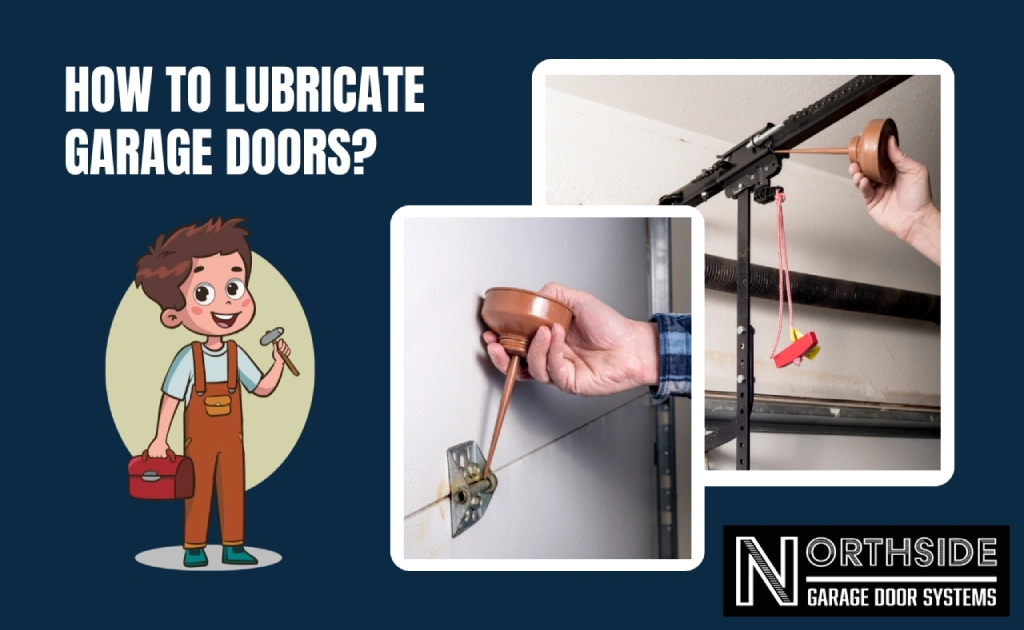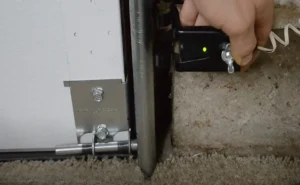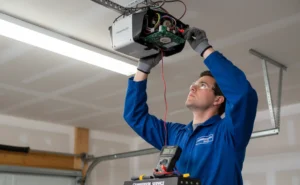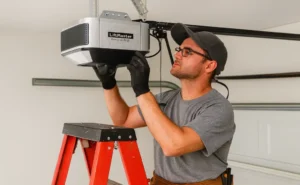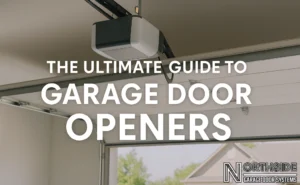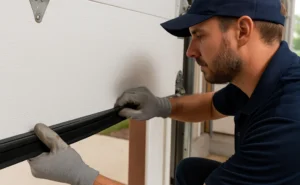Just like many of the doors inside your home, you likely open and close your garage door multiple times every day. Your garage door is an essential part of your home, offering security as well as aesthetics. While they are created to be long-lasting, you may encounter some issues with your garage door from time to time, which may include noise, stiffness, and misalignment. Knowing how to lubricate garage door components can help prevent these issues from escalating. Ignoring these issues may lead to more costly problems, so it’s best to address them right away.
Many homeowners want to know how to lubricate garage doors because noise is one of the most common complaints. Good maintenance, which includes regular lubrication, can help mitigate and eliminate many of the garage door issues that people deal with. This article explores the causes of noisy garage doors, why it’s important to keep them lubricated, and a comprehensive guide that instructs you how to get the job done.
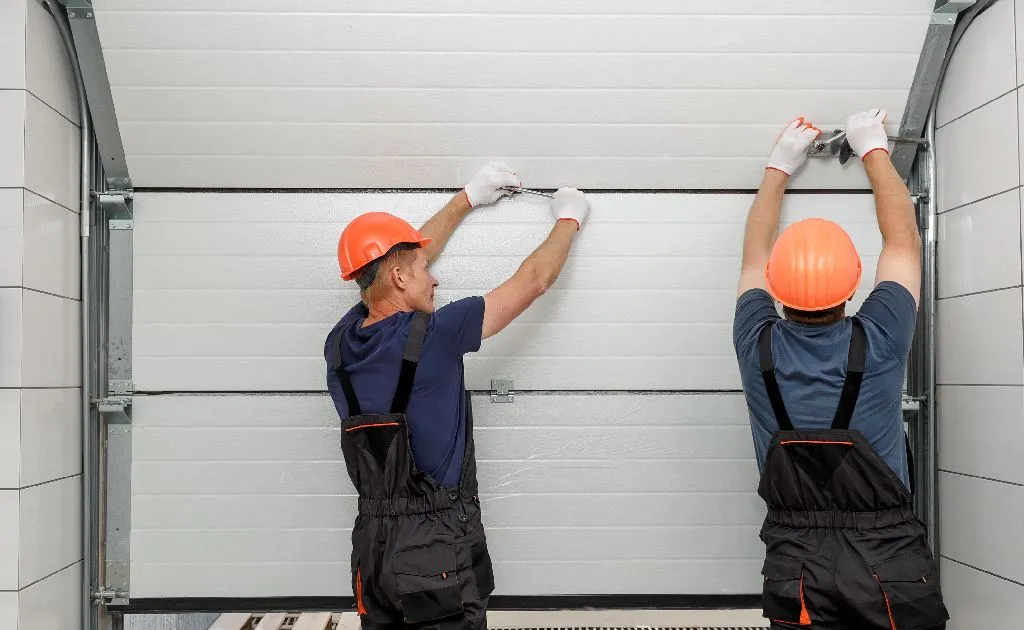
In many cases, a noisy garage door is the first indication that you have a problem. Why do garage doors start making noise over time? There are several factors that play a role in this and knowing what they are can help you determine the cause so you can address it appropriately.
Reasons 01: Wear and Tear on Moving Parts
A garage door is heavy, weighing many hundreds of pounds. In addition, the door has a number of moving parts involved in its operation. That includes rollers, springs, tracks and hinges. With time, each of these components suffers wear and tear, which increases friction and resistance between them, often leading to noise.
Reasons 02: Lack of Lubrication
One of the top reasons you may be hearing noise from your garage door is that you need some lubrication. Because so many of the parts of a garage door are made from metal, they need to be properly lubricated on a regular basis to reduce friction. Without lubrication, metal rubbing on metal will cause garage door noise, including grinding, squeaking, and clanking.
Reasons 03: Misaligned Tracks
When the tracks are misaligned, you might be hearing noise from your garage door. That’s because when tracks are not where they should be, they don’t glide smoothly, resulting in a jerking motion that is almost always accompanied by a loud sound.
Reasons 04: Loose Hardware
Each time you open or close your garage door, the vibration that results can loosen hardware, including screws, bolts and other components. The result is an unpleasant rattling or banging sound that you’ll hear every time you operate the door.
Reasons 05: Worn-out Rollers
The rollers are what helps the garage door open and close smoothly. As with any other component of the garage door, they can wear out over time. When that happens, they will create a rather significant amount of sound. The same is true if the rollers are damaged for any reason.
Figuring out what’s causing the noise in your garage door and addressing it appropriately is important for its longevity, but also for your comfort when opening and closing it. Ignoring the sounds can lead to more problems, including mechanical failures that may require replacing the door altogether.
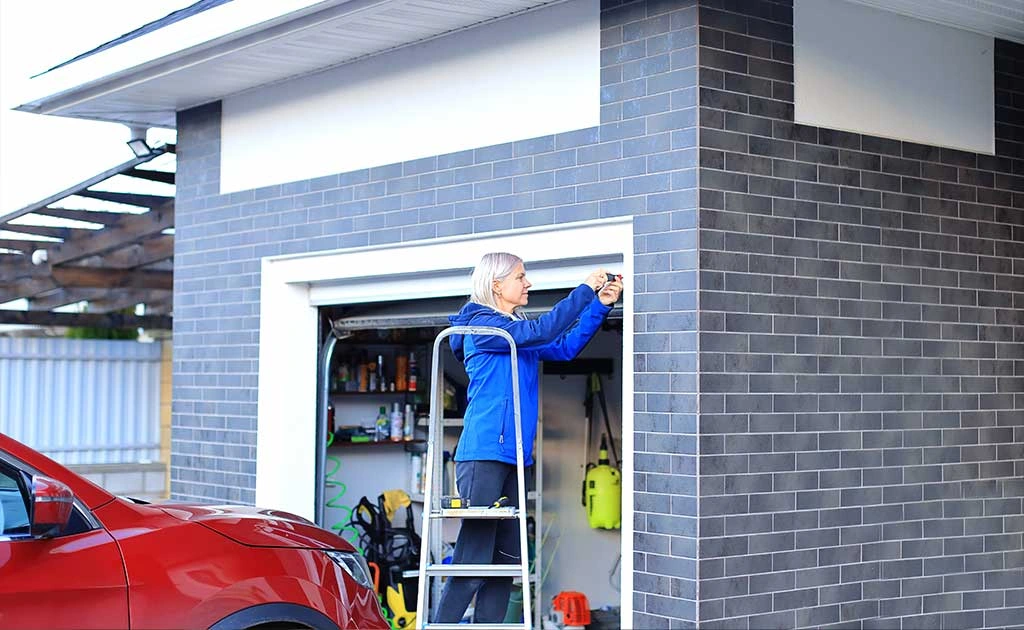
Importance of Lubricating Your Garage Door
Knowing how to lubricate garage doors is important for ensuring they work properly at all times. In fact, regular lubrication is one of the simplest and most effective ways to keep your garage door in top shape. When you lubricate the moving parts, you can prevent many of the issues and keep the door working smoothly and quietly.
- Reduce Friction: The primary benefit of consistently lubricating your garage door is reducing and controlling friction between the door’s moving parts. By minimizing such friction, the garage door moves more freely, which in turn, reduces the strain on the motor and extends the lifespan of all of the door’s components.
- Quiet Operation: As you’ve already learned, a noisy garage door is usually due to the moving parts rubbing against each other without proper lubrication. The lubrication creates a barrier between the components and significantly reduces the noise caused when the door is operated.
- Prolong the Life of Components: Garage door lubrication reduces noise but also prolongs the lifespan of every component that makes up your garage door. Failing to learn how to lubricate garage doors, including their rollers, springs, and hinges, means it won’t last as long, and you may end up with costly repairs and replacements.
- Prevent Rust and Corrosion: If your door is proving difficult to move by hand, then you will need to apply an amount of lubricant to the tracks and rollers to encourage it to move more smoothly. Make sure to only use a lubricant that is specifically intended for garage door use, otherwise you risk damaging key components.
- Improve Performance: When your garage door is well lubricated, it will operate efficiently and put a lot less strain on the motor that raises and lowers it. Not only does this ensure that the door opens and closes quickly, but it also takes less energy to operate.
Proper lubrication is a crucial part of garage door maintenance and is something that shouldn’t be overlooked. When you take the time to lubricate your garage door appropriately, you help reduce the risk of many of the common problems that cause noise, while ensuring that it lasts for many years to come.
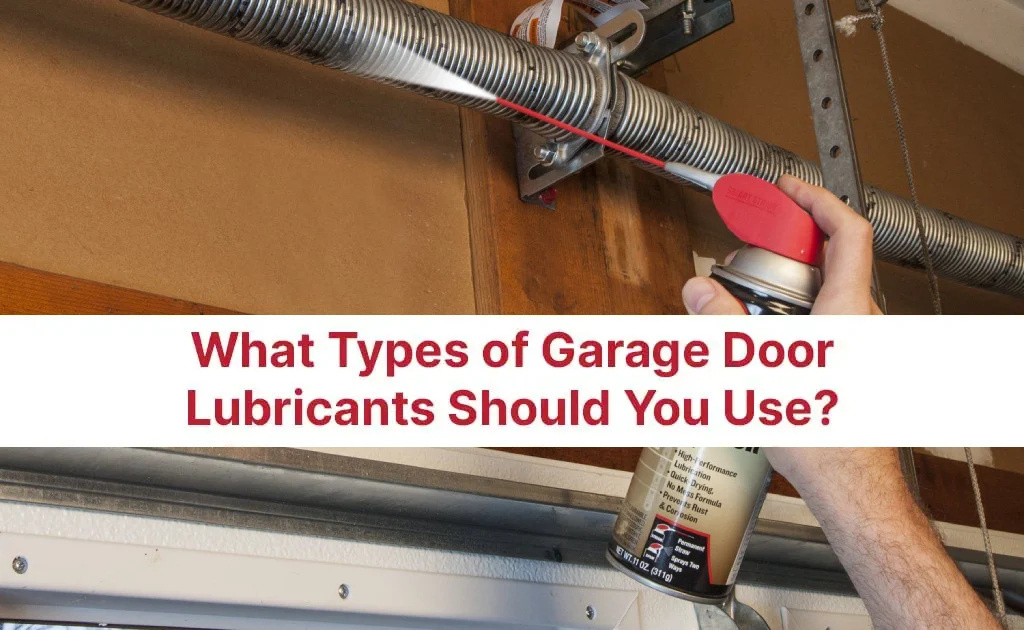
What Types of Garage Door Lubricants Should You Use?
Part of the answer for how to lubricate garage doors is choosing the right kind of garage door lubricant to get the job done. Not all products are created equal, so you want to evaluate your choices and make a selection that is specially designed for garage door maintenance.
Type 1: Silicone-based Lubricants
A silicone-based product will be the best door lubricant type for most garage doors. That’s because it resists moisture and offers long term lubrication, so you can rely on it for quite some time. It’s also less likely to get gunked up with fuzz and dirt. Silicone spray lubricant is especially useful for tracks, hinges, rollers and other metal components.
Type 2: Lithium Grease
This is another effective option for lubricating garage doors. Lithium grease is a heavy-duty choice that works well on high-friction areas, such as the springs or the chain that operates the door. Lithium grease is thicker than silicone lubricant and offers a durable layer of protection for your garage door.
Type 3: Avoid WD-40
WD-40 is a popular lubricant for many jobs around the house, it’s not recommended for your garage door. That’s because it’s classified as a solvent, rather than a lubricant, which means it’s ideal for cleaning and loosening parts, but doesn’t offer the long term lubrication benefits of the other above options.
Type 4: Teflon-based Lubricants
Another answer is a Teflon-based product, which is ideal for metal on metal components. Much like silicone, Teflon repels dust and dirt, while also offering a long term layer of lubrication.
To sum it up, your best choice for lubricating your garage door is either a silicone or lithium grease product. They both offer the necessary lubrication and protection that your garage door needs to operate at its best.
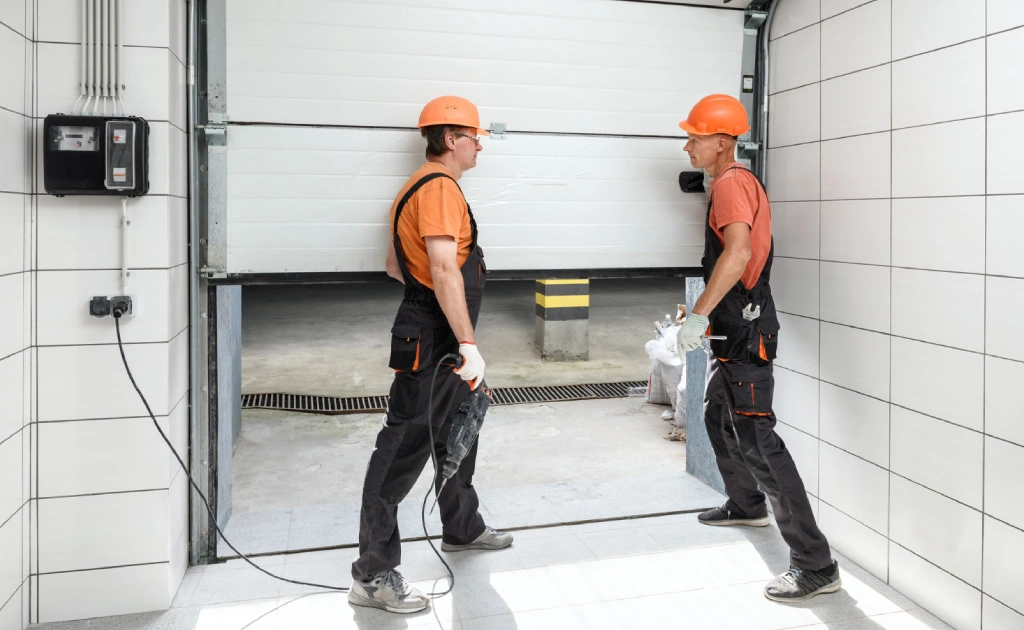
Garage Door Pre-lubrication Preparation: Tools & Supplies Step-by-step Explained
Before you carry out the lubrication process, it’s best to understand some easy-to-follow garage door pre-lubrication steps. Following these steps ensures that the job goes smoothly and is done effectively. Proper preparation sets the optimal foundation for answering the question of how to lubricate garage doors.
Step 1: Disconnect the Garage Door Opener
For your safety, it’s imperative to disconnect the garage door opener before getting started. This keeps the door from accidentally moving while you’re performing maintenance on it. Follow the manufacturer’s directions for your specific garage door.
Step 2: Clean the Tracks
You won’t need to lubricate the actual tracks, but you do want to give them a good cleaning before lubricating the other parts. Use damp cloth to get rid of dirt, dust, and other debris that has accumulated. This optimizes the gliding of the rollers after they’ve been lubricated.
Step 3: Inspect the Door for Damage
Before applying any lubricant, inspect all of the components of your garage door. Look for damage and signs of wear and tear. That might be cracked rollers, loose hardware, or frayed cables. If you see any problems, take care of them before lubricating.
Step 4: Gather Your Supplies
Before you begin any garage door maintenance projects, be sure to gather the supplies you will need so they are close at hand when you get started. That includes the type of lubricant you’ve chosen, a clean cloth, and a ladder if you aren’t tall enough to reach the high parts of the garage door.
Step 5: Protect Surrounding Surfaces
To ensure that you don’t accidentally spray lubricant on the walls or floor, use a large tarp or drop cloth to protect the area while you work. This way, the cloth catches any drips or spills and makes clean up easier.
Following these steps before lubricating your garage door ensures that it is properly prepared and ready for efficient application of the lubrication.
How to Lubricate Garage Doors in 7 Simple Steps
Here we are at the ultimate answer to how to lubricate garage doors. Knowing the process makes it easier to complete the job. Once your garage door is adequately prepped, follow these lubricated garage door steps from start to finish.
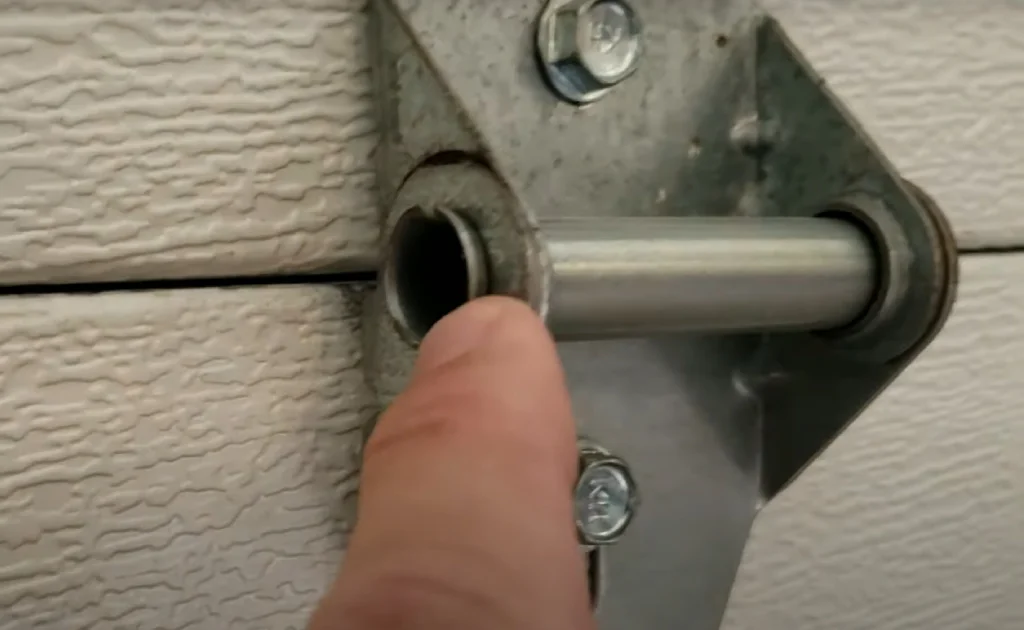
Step 1: Lubricate the Hinges
Start the job by applying a small amount of lubrication to the garage door hinges. This component allows the door to bend and fold when you open or close the garage door. Make sure the lubricant is applied to all the moving parts of each hinge, then open and close the garage door a few times, which helps to distribute the product evenly.
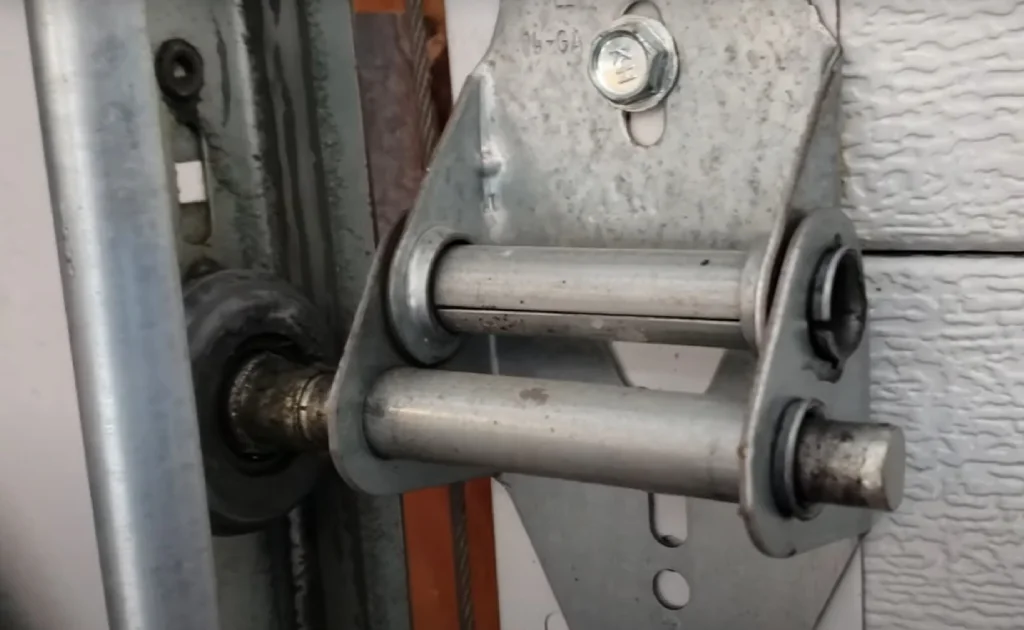
Step 2: Lubricate the Rollers
Next up is the rollers, which are small wheels that assist the door as it glides along the tracks. Spray lubricant on the ball bearings inside the rollers, taking care not to spray the nylon or plastic outer portion of the rollers. Even application ensures that the rollers glide efficiently along the tracks.
Additionally, if for some reason your garage door roller is no longer working, you may need to replace it. We have a guide on how to replace your garage door roller.
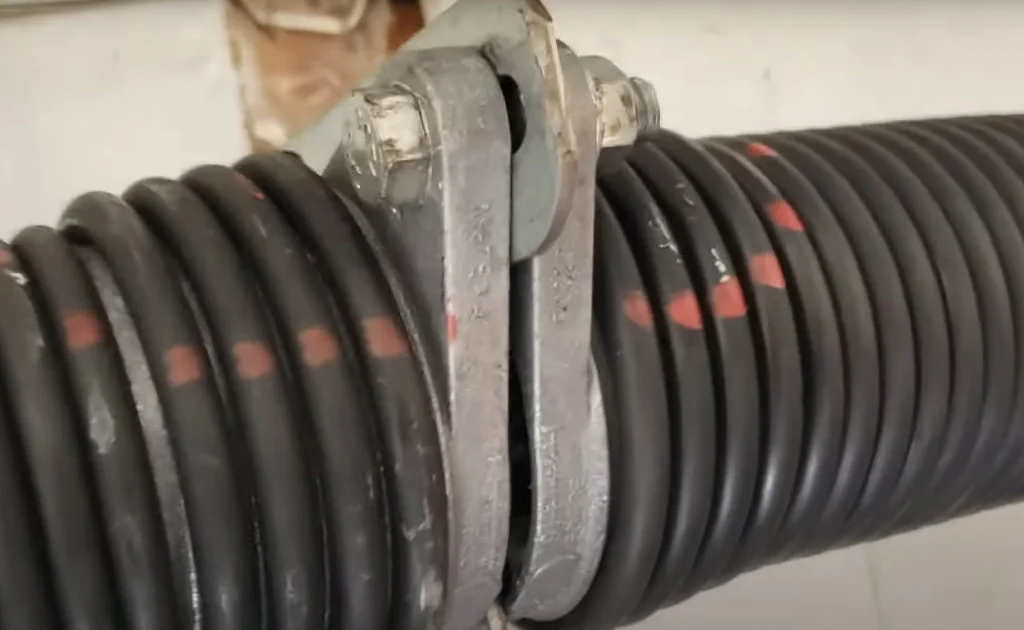
Step 3: Lubricate the Springs
The third step in lubricating a garage door is to work on the springs. Because the springs are under a lot of tension, even adequate lubrication is important to keep them from becoming stiff and noisy. Spray your chosen lubricant all along the springs, then open and close the garage door a couple of times to properly distribute it.
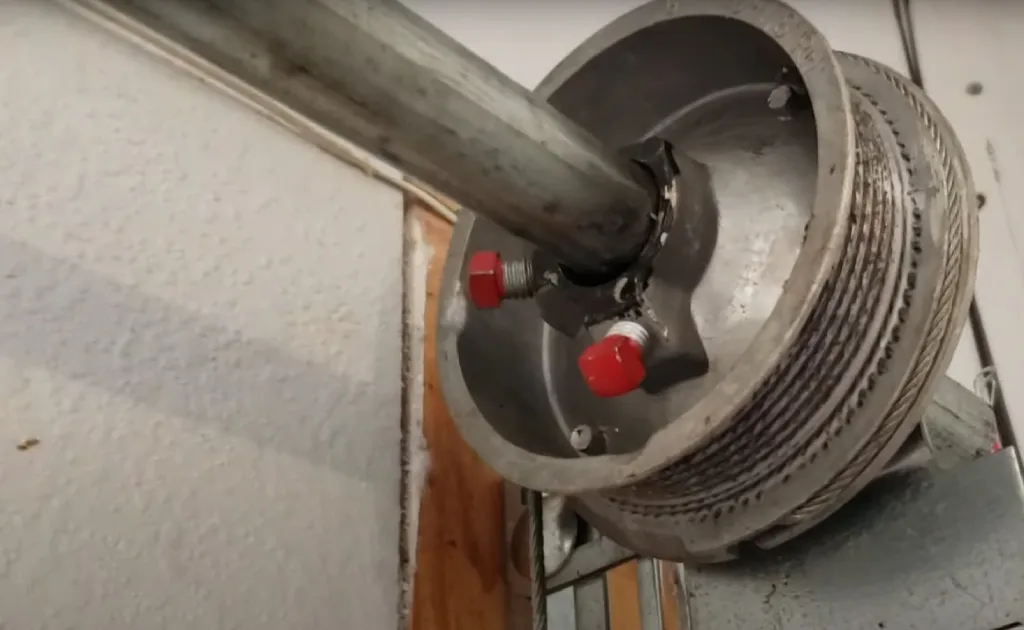
Step 4: Lubricate the Bearings and Pulleys
Lubricating the garage door’s bearings and pulley is crucial because their job is to work the cables that help open and close the door. Take care not to use too much lubricant on these components, just enough to cover them is plenty.
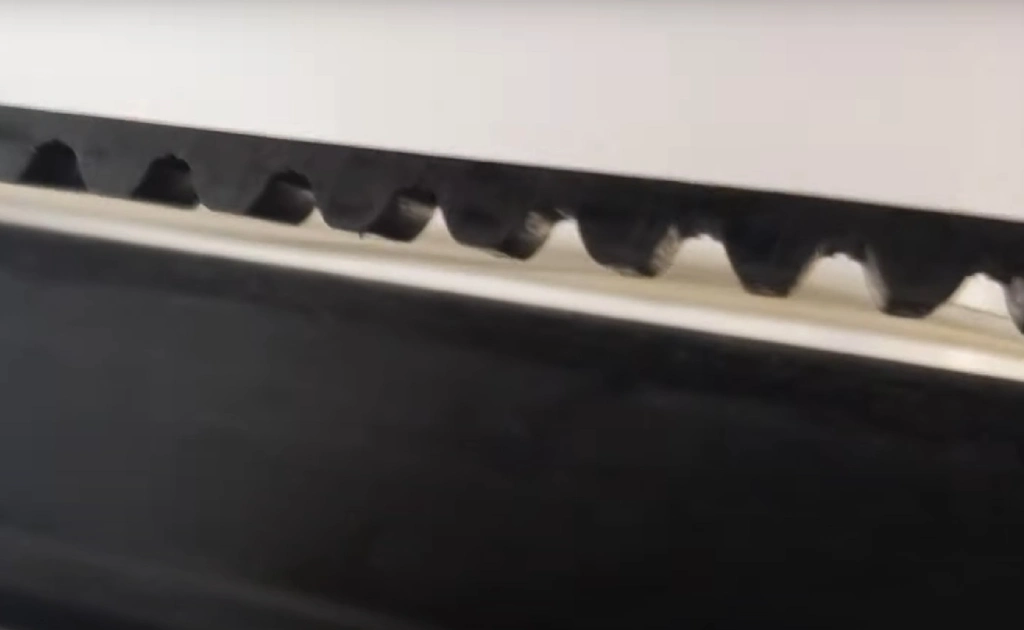
Step 5: Lubricate the Chain or Screw Drive
If you have a garage door with a chair or screw drive, the area needs to be well lubricated. Lithium grease is the best product for this aspect of the job. Apply just a small amount to the area, which helps the door open and close noiselessly and smoothly.
Step 6: Lubricate the Lock and Arm Bar
This area is sometimes overlooked but needs a small touch of lubricant. Apply it to the keyhole and all moving parts of the lock, as well as the bar that connects the garage door to its opener.
Step 7: Wipe Away Excess Lubricant
Finally, use a clean cloth to wipe away any extra lubricant. This keeps dirt and debris from building up on the components of your garage door, while also ensuring that it operates properly.
Using these seven simple steps, you can be sure that your garage door is adequately lubricated and in top working order at all times.
Common Garage Door Issues Beyond Lubrication
Knowing how to lubricate garage doors isn’t the only maintenance step you should be aware of. Identifying other potential issues allows you to address them before they become a bigger problem. In addition to the above-outlined garage door lubrication tips, here are some other things to be on the lookout for.
1st Issue & Solution: Misaligned Tracks
If your garage door isn’t opening and closing properly, even when well lubricated, the tracks may be misaligned. Check and adjust as needed, calling a professional if you can’t do the job on your own.
2nd Issue & Solution: Broken Springs
Because the springs on your garage door are under a lot of tension, they tend to wear out over time. Check for broken springs and have them replaced as soon as possible. If your garage door isn’t opening and closing well, that’s a sign that you might have a broken spring.
3rd Issue & Solution: Worn-out Rollers
Rollers wear out over time, even if you lubricate them on a regular basis, so it makes sense to inspect them regularly. If your garage door isn’t rolling smoothly on the track or there’s visible damage to the rollers, it’s time to replace them.
It is important to replace the door rollers at the specified time because if you do not do so, your garage door may not close completely on one side.
4th Issue & Solution: Loose Hardware
The vibrations that occur when your garage door rolls up and down can cause hardware to loosen over time. Examine all hardware regularly and tighten any components that have become loose.
Addressing these common issues, along with following a consistent lubricating habit, helps your garage door last longer and operate smoothly.
Seasonal Maintenance Tips for Garage Doors
Maintenance on your garage door should be a regular job, not a one time thing. It will require attention throughout the year, especially when the seasons change. Various types of weather can impact your garage door in different ways so it’s important to adjust your maintenance duties accordingly. Here are some seasonal maintenance garage door tips that you need to add to your schedule.
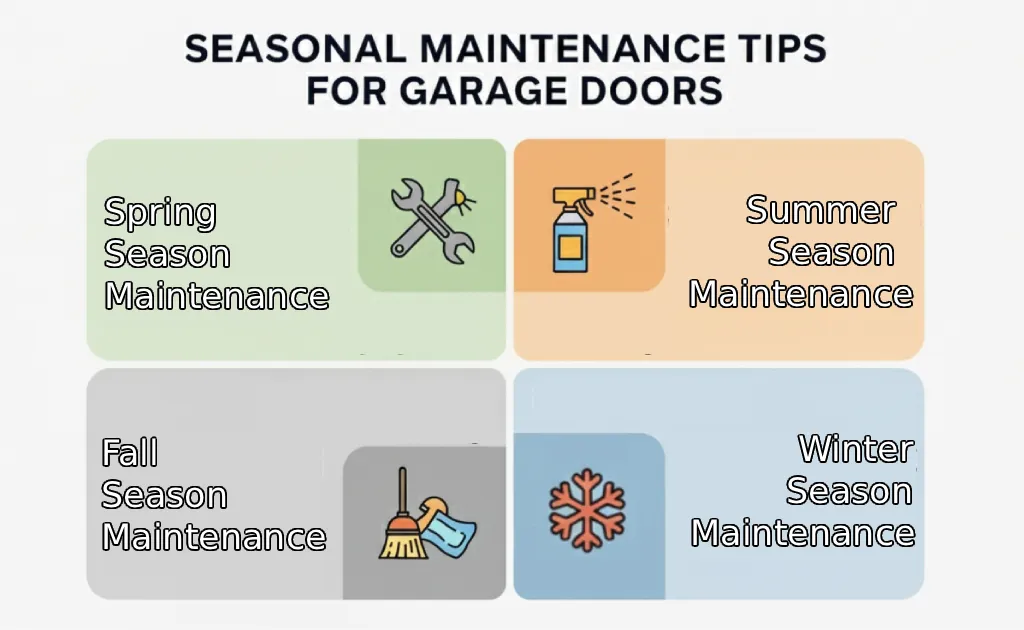
Spring Season Maintenance
In the spring, as the weather gets warm, inspect your garage door for damage that might have happened during the winter months. This is also a good time to clean the tracks, lubricate all of the moving parts, and check the springs for damage or rust.
Summer Season Maintenance
When it’s hot outside, certain components of your garage door can expand due to the heat. This can cause misalignment and more friction. For that reason, during the summer, it’s a good idea to lubricate the door regularly to prevent these issues.
Fall Season Maintenance
When summer ends and the temperatures get cooler, it’s an ideal time to prepare your garage door for the winter ahead. Lubricate all of the moving parts, clean the tracks, and look for any damage that needs to be addressed before the winter sets in.
Winter Season Maintenance
Opposite of the hot weather, frigid temperatures can cause the metal parts of your garage door to contract. This can make the door stiff, causing difficulty when opening and closing. To keep this from becoming a problem, lubricate your garage door more often during the winter.
Benefits of Regular Garage Door Lubrication
Think of garage door lubrication like giving your car an oil change—it’s a simple task that keeps everything running smoothly and prevents major problems down the road. Regularly spraying the moving parts of your garage door can make a huge difference.
Benefit 1: Longer Lifespan
Just like any machine with moving parts, your garage door experiences wear and tear. Lubrication reduces friction on the rollers, hinges, and springs. This simple step protects these metal parts from grinding against each other, which helps your entire garage door system last much longer.
Not only does it protect the garage door, but it also helps the garage door panel function smoothly and prevents the risk of frequent garage door panel replacement.
Benefit 2: Quieter Operation
Is your garage door loud enough to wake the whole neighborhood? Squeaking, grinding, and screeching noises are often just a sign that the metal parts need lubrication. A quick spray on the moving components will reduce friction and make your door operate almost silently.
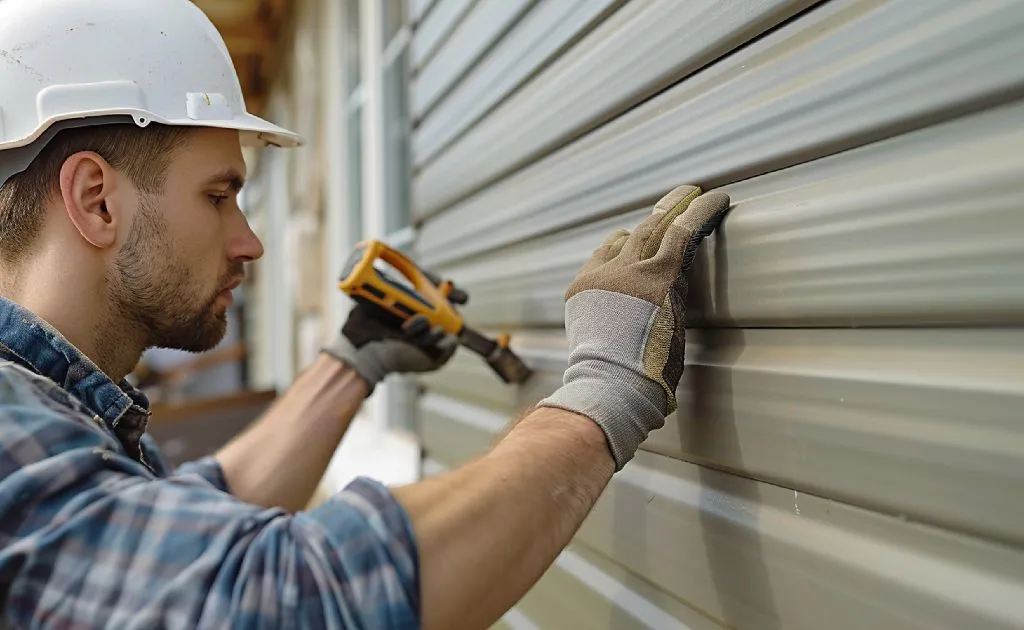
Benefit 3: Prevents Emergency Repairs
A door that isn’t lubricated is working much harder than it needs to. This extra strain can cause parts like springs and cables to snap unexpectedly, trapping your car inside or outside the garage. Regular lubrication ensures all parts move freely, preventing sudden breakdowns and inconvenient emergency repair calls.
Benefit 4: Saves Money Long-Term
Taking a few minutes to lubricate your door can save you a lot of money. By extending the life of your door’s components and preventing expensive emergency repairs, you’ll avoid the high cost of replacing major parts or the entire system. It’s a small investment of time that offers a big financial return.
FAQs
What is the best lubricant for garage doors?
The best lubricants for garage doors are silicone-based sprays or white lithium grease. These products reduce friction, last longer, and protect the moving parts without attracting too much dirt.
Can I use WD-40 to lubricate garage doors?
No, WD-40 is not a good choice for garage doors. It works as a cleaner and rust remover, but it doesn’t provide lasting lubrication. Instead, use silicone spray or lithium grease for smoother operation.
How often should you lubricate a garage door?
You should lubricate your garage door about every six months. If your door makes squeaky noises or feels stiff, you may need to do it more often, especially in cold weather.
Which parts of a garage door need lubrication?
Focus on these moving parts:
- Hinges
- Rollers (the bearings, not the plastic wheels)
- Springs
- Bearing plates
- Opener chain or screw drive
Should I lubricate garage door tracks?
No, you should not lubricate the tracks. Tracks should be kept clean and free of debris, but adding grease or spray can make dirt stick and cause problems. Instead, just wipe them with a damp cloth.
Conclusion
Learning how to lubricate garage doors doesn’t have to be complicated or time-consuming. Knowing why your garage door might be making noise and understanding the steps to get it taken care of before it becomes a bigger issue. Regular maintenance is the key to having a garage door that you can rely on for many years to come.

